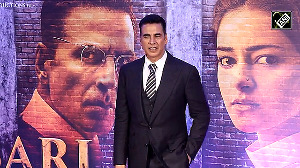India's quest for a permanent seat in the United Nations Security Council got a boost when Japan agreed to support its claim. In return, India agreed to support Japan's claim to a permanent seat in the Security Council.
This was decided on August 13 during the visit of Japanese Foreign Minister Yoriko Kawaguchi to Delhi. Kawaguchi held talks with External Affairs Minister Natwar Singh, and also met National Security Advisor J N Dixit. She later called on Prime Minister Manmohan Singh.
New Delhi now has reciprocal arrangements with most of the other nations seeking a permanent seat in the Security Council. India has such reciprocal agreements with Germany and Brazil in place already, both of who are seeking a permanent seat. This also means India has a reciprocal arrangement with contenders from the various except Africa.
Sources told rediff.com that the reason India has still not made a reciprocal deal with any African nation is that none has emerged as a clear contender with the contest between South Africa and Nigeria, the two largest nations in the continent.
With India and Japan agreeing to back each other rather than contest against each other, the chances of both are much better. Till recently, the fact that both countries believed they had a right to a permanent seat was a source of friction between the two nations.
India claims a seat on the basis of its huge population, growing economy and contribution to the various activities of the United Nations. "India and Indians, both as delegates and in their individual capacities, have contributed enormously to the UN in terms of formulating policies, implementing policies, in peace-keeping operations, and other duties," pointed out the sources.
India is banking on this huge goodwill built up over the past almost 60 years as one of the factors in its favour.
"Ultimately, we believe that the UN must reflect the world as it is in 2005 and not as it was in 2004. Hence we, and many other nations, believe it is time to change the structure of the UNSC," the sources added.
The good news for India is that from among the current permanent members, Russia, France, and the United Kingdom have all backed New Delhi's claim to a permanent seat. But the United States, the world's only superpower, and China, India's neighbour and the emerging superpower, have not extended support to New Delhi's bid.
"Officially, the US and China have not yet stated their positions, so we cannot say they will not support our claim," the sources said.
While the US is mum on India, it has in the past voiced support for Germany and Japan (both among its largest trading partners and close allies) for a permanent seat.
Beijing is not expected to extend support for Japan or India. Memories of Japan's occupation of China still rankles many Chinese. At the same time, it is wary of India's aspirations to play a larger global role.
While the contours of the restructuring of the United Nations Security Council remains unclear, the pressure to revamp and reinvigorate the UN is rising. "Especially after the UN was bypassed in the Iraq war, many countries are keen to strengthen the UN and believe that expanding the Security Council would be a big step in that direction," the sources said.
UN Secretary General Kofi Annan has set up a committee to examine how best to accommodate the aspirations of many countries that want to be a part of the Security Council, yet ensure that the council remains small enough to make, and implement, policy decisions.
One of the suggestions was to make the UN more representative by expanding the UNSC to 25 members (from the current 10) with 10 permanent members (from the current 5). The aim was ensure a permanent seat to the larger and/or most powerful country or countries in each continent.
On this basis, Brazil, with the largest economy and population in South America, Germany, the world's third largest economy and the largest in Europe, Japan (the world's second largest economy) and India (the world's second most populated nation) sought a seat on the council.
If accepted, a new, restructured Security Council might have as permanent members the US, UK, Russia, France, China, Germany, Japan, Brazil, India, and probably one country from Africa.
A permanent seat on the Security Council is considered extremely prestigious and improves a country's standing in the world. Politically, permanent members have the power to block any resolution, thus making it virtually impossible to ever pass a UN resolution against a permanent member. Some years ago, the US had suggested that any new permanent member must not have the veto power, which understandably was rejected outright by the other nations.
Incidentally, each aspiring country faces strong opposition from within its own continent. Argentina opposes Brazil's bid, Italy that of Germany, South Korea points out to Japan's occupation of its territory in the Second World War, while India has had to contend with Pakistan, which insists that the Jammu and Kashmir issue be resolved first.







 © 2025
© 2025